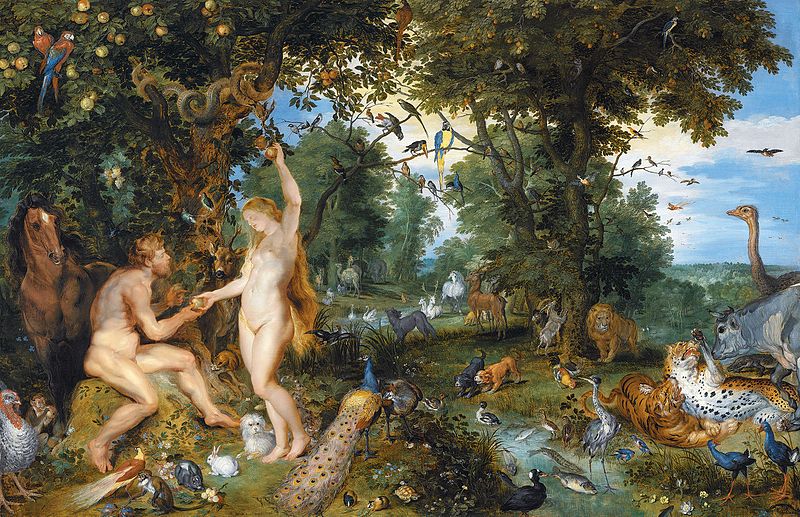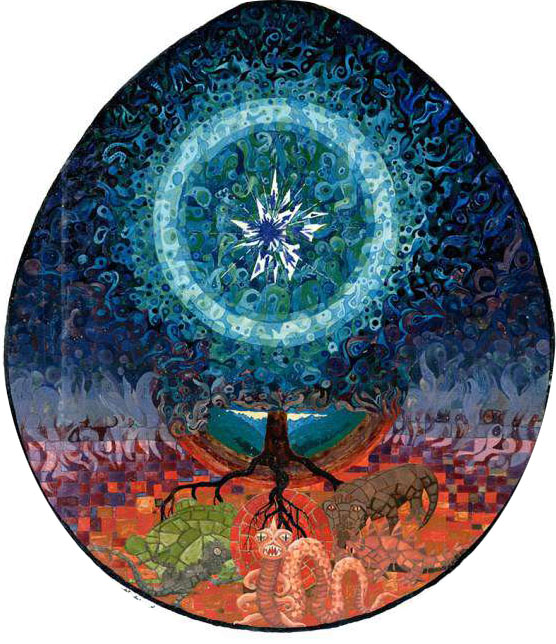In 2008 I embarked upon a grand journey. I wanted to know why I had strong feelings of unworthiness, shame and self-hate buried deep within, despite having never been directly shamed by my parents or any religion. I also wanted to know why so many seem to struggle with varying forms of self-aggression, believing they are born broken and living life forever trying to prove their worth to the world, and for some, to a higher power. Without knowing where it would lead, I began work on a deeply personal thesis paper that aimed to explore these burning questions. What I ended up discovering made a deep and lasting impact. I came to understand that these pervasive self-aggressive patterns are for many rooted in beliefs of basic badness, and that healing this wound in myself and others was part of my life’s work. The central discovery I made was the relationship between the prevailing interpretation of the Biblical myth with Genesis of Adam and Eve’s Fall from Grace, known as the doctrine of Original Sin, and a secular culture of self-aggression and a compulsive need to prove our own goodness and worth. What I offer to you now is a revised edition of that original thesis broken up into more bite size pieces, with the more personal elements reflecting my inner state at that time. This blog series aims to explore the origins of these harmful beliefs, examine their impact, and provide methods to help overcome them both as an individual and a society. I hope you find embarking upon this journey as enlightening and helpful as I have.
____________________________________________________________________________
I find nothing more offensive than a god
who could condemn human instincts in us that time in all its wonder
have made perfect.
I find nothing more destructive to the well-being of life
then to support a god that makes you feel unworthy and in debt to it . . .
A god that could frighten is not a god—but an insidious idol
and weapon in the hands of
the insane.
~ Meister Eckhart
Born Broken
The prominent Christian doctrine of Original Sin looks at the Biblical story of Adam and Eve and proclaims “All human beings are born sinful and in need of salvation.”1 Martin Luther, the founding father of the Lutheran Church, once succinctly summed up the fundamentals of how most of us have come to understand the concept of original sin when he said “I am shit covered in snow.”2 In my own life I have consciously rebelled against such pessimistic notions of human nature, and through my personal journey and my work as a counselor, I have come to believe that our true nature is loving and good. However, despite my best efforts to remember this, I often find myself falling into patterns of self-judgment, which to my dismay, mirror Luther’s gloomy interpretation. It is as if the belief that we are fundamentally bad or broken possesses a mysterious strength and seductive pull within the psyche. Over time I have come to respect this force and have become quite curious about it’s origins, the most likely of which I believe to be the doctrine of original sin. What follows is an exploration of this hypothesis, including how the doctrine of original sin came about, how it may have reached beyond its religious bounds, and whether this dark outlook of human nature has always been the interpretation of The Fall . . .
 The Original Sin We Have Come to Know
The Original Sin We Have Come to Know
In the modern doctrine of original sin the story is as follows: Adam and Eve, against the commands of God, sinned, i.e.—did something fundamentally wrong—by eating the forbidden fruit from the Tree of Knowledge of Good and Evil and were thus punished by being cast out of the Garden of Eden. As a result of this Fall from grace, Adam and Eve passed down the black mark of original sin to all their progeny–the entire human race. This popular interpretation can today be found prominently in many of the Christian reformation traditions including those of the Presbyterians, Evangelicals, Lutherans, Episcopalians, Baptists, Protestants, Born Again Christians, and so forth. In this particular view the human race is born into sin and one must repent in the eyes of God and accept the savior Jesus Christ into their heart if they ever hope to be redeemed and allowed into heaven.
Contrary to what many believe today, there are in fact many interpretations of the Biblical myth of The Fall, as well as numerous interpretations surrounding the doctrine of original sin itself, some dating back before our common understanding. However, it is this common understanding that has taken root and has had the biggest impact on our culture.
I firmly believe that our culture’s deep Puritanical roots continue to influence us today and that many, regardless of their upbringing or religious affiliation, carry a heavy burden of concepts and beliefs rooted in original sin. In Gestalt psychotherapy these psychological structures would be referred to as Introjects–the unexamined and often unconscious ideas and beliefs we swallow whole from our family and culture during childhood. Though these beliefs may be more conscious in some than others, and often go undetected because of widespread cultural acceptance, they are still there operating within the psyche of nearly everyone in the West. They are particularly concentrated here in the United States and I believe have a powerful effect on our behavior and experience of reality.
Our personal histories play a role in the severity of the self-aggressive tendencies and thus our ability to cope and function in the world. However, there are also societal structures and collective beliefs in place that act as a positive feedback loop reinforcing and condoning such beliefs.
The doctrine of original sin stands out as one of the central avenues through which a view of human nature as basically bad crossed over from organized religion and entered the unconscious psyche of mainstream Western culture.

Personal Encounters & Reflections
I didn’t grow up with original sin in my household but all my neighbors did and when I would walk over to my best friend’s house and accidentally use the Lord’s name in vain, I would get a nasty look like I must surely be a hopeless sinner in need of salvation. My neighbor and best friend completely bought into the idea of being born into sin, which his parents rarely forgot to remind him of, and for which I had great difficulty comprehending. It always seemed totally ridiculous to me, that is, until years later when I began to uncover some beliefs about myself that felt eerily familiar.
It is an ongoing journey. The belief runs deep but I now have the courage and grounding in my true being to expose this darkness and let in a little fresh air and sunshine on this shadowy figure. I do this in bits and pieces, and in the darkest hours I have held onto trusting that my journey can help others uproot their own stagnant and festering criminal beliefs about who they are and make whole what was once fragmented.
It is embedded way down there at the core but it is not the core, and there seems to be something pushing me to continually investigate just how widespread and destructive this idea, which has taken root in the hearts and minds of so many, really is.
I am on the hunt, I have everything I need, and I won’t stop until I track it all the way back to its dark tower of conception. And, when I arrive perhaps I’ll find upon entering not an otherworldly beast, but an ephemeral mirage no more real than a dream conjured up by my own illusory concepts, judgments and beliefs. Or, perhaps I’ll find that it is merely a part of me that I have judged and condemned to rot and fester in some dark hidden dungeon of my psyche and in there twist and scare around this condemnation.
Digging Deeper: A Psychological Perspective
I have come to realize that though the darker aspects of myself have for many years remained unconscious, part of me was aware of them and had been judging them as well as trying to hide them. This has resulted in a constant drive for perfection in order to prove my own worth or goodness. Some of the psycho-side effects of my unconscious belief in basic badness have included social anxiety, feelings of shame, unworthiness and a restraining fear of failure and making mistakes. Though I have come to intimately know my own basic goodness—the experience of my essential being as pure goodness or beyond notions of good and bad, right and wrong—the embedded beliefs remain and continue to hold sway within my mind.
This tendency to look within, dislike what we see, reject and repress it, and then to judge ourselves guilty for it, is a recognized pattern of the human psyche within the field of psychology. Shifting this tendency by adopting a less reactive and more exploratory stance towards what we repress is central to the therapeutic process.3 For example, when I judge myself harshly for selfish or cruel thoughts or behavior, as defined by my culture and familial upbringing, it radiates out to others and suddenly the world becomes a cruel and dangerous place to inhabit.

Illuminating Original Sin with Depth Psychology
The pioneering psychologist Carl G. Jung would have known Luther’s “snow covering” aspect of the psyche to be the persona, which is the part of ourselves that we would like to present to the world. However, this snow melts quickly and often cracks to reveal the shit, or in Jung’s term, the shadow, underneath. The shadow is often not pleasant to look at, as it is filled with all the aspects of our personality that we are either unable to or would rather not deal with, and thus often quite unconsciously hide away in the dark, dank, and massive cellar which Jung called the unconscious. When the conglomeration of thoughts and feelings which make up what is perceived to be the solid continuous sense of “me,”—the ego— takes a trip down into the cellar, and peeks into the blackness, it is generally not sugar plums fairies that are encountered. Instead the contents of the unconscious tend to be more along the lines of angry fire breathing serpents and other shadowy figures. With such a place within ourselves why then would anyone have any reason to believe that we are fundamentally good?
This question has been particularly important to me as one who has spent many years of my life on a spiritual path that has encouraged taking frequent trips into the shadow in order to bring unconscious material up to the level of the conscious. Fortunately, there is a good reason for investigating the unconscious, a process that is integral to any form of depth psychology, such as Jung’s analytical psychology. We often mistakenly over-identify with the shadow when:
What is actually underneath the snow and within the shadow resides what Jung called The Self, the great mystery of our essential being which is already whole and complete.
Maintaining a perfect rigid persona and protecting the ego against the chaos of the unconscious, even with the help of social media, is an exhausting, thankless, and never-ending task doomed to failure. Many of the most prominent psychologists since the time of Freud have clearly and consistently stated that repression does not work, for what we resist persists and what we repress only grows stronger and darker as it festers in the unconscious.3 Though repression and denial often serve the healthy purpose of protecting our psyche from situations and feelings that we may be developmentally unready for, we often forget that when we are ready to deal with them we must begin the often uncomfortable process of peeling off the layers of denial and examining our shadow.
Who is to Blame?
 What are we to do and who are we to blame for this epidemic of damaging self-aggressive beliefs? I myself would like to come right out and in part blame St. Augustine, whose major contribution to the Catholic Church was the doctrine of original sin that we know today.4 However, as convenient as it might be to blame one singular historical figure for much of the guilt and unworthiness over the past 17 centuries in the West, the fact remains that the seed of original sin must have been planted in incredibly fertile soil for it to grow as well as it has. The human psyche in the West has been that manure rich soil.
What are we to do and who are we to blame for this epidemic of damaging self-aggressive beliefs? I myself would like to come right out and in part blame St. Augustine, whose major contribution to the Catholic Church was the doctrine of original sin that we know today.4 However, as convenient as it might be to blame one singular historical figure for much of the guilt and unworthiness over the past 17 centuries in the West, the fact remains that the seed of original sin must have been planted in incredibly fertile soil for it to grow as well as it has. The human psyche in the West has been that manure rich soil.
Original sin is but an external structure that reflects a part of the Western psyche that has become rigid. Both the shadow of the collective unconscious in the West, a term Jung used for the way groups seem to share aspects of their unconscious, and the doctrine of original sin, are now intertwined in a mutually beneficial symbiotic relationship. This relationship serves to retain many harmful and outdated beliefs. However, as Jung’s analytical psychology has demonstrated, it is possible to shine enough light on our being to melt through the error of identification with our persona and our shadow, to reveal an original wholeness and goodness underneath.
Next Time in Born Broken (Part 2) – To Miss The Mark: Reinterpreting the Mythology of The Fall . . . Stay Tuned.
References
- Jones, T., & Edmonson, R. J. (2006) You Converted Me: The confessions of St. Augustine. Brewster, Massachusetts: Paraclete Press.
- Father Breslin, personal communication, February 23, 2009.
- Ewen, E. B. (2003). An Introduction to Theories of Personality (6th). Mahwah, New Jersey: Lawrence Elbaum Associates.
- Jones, T., & Edmonson, R. J. (2006) You Converted Me: The confessions of St. Augustine. Brewster, Massachusetts: Paraclete Press.

